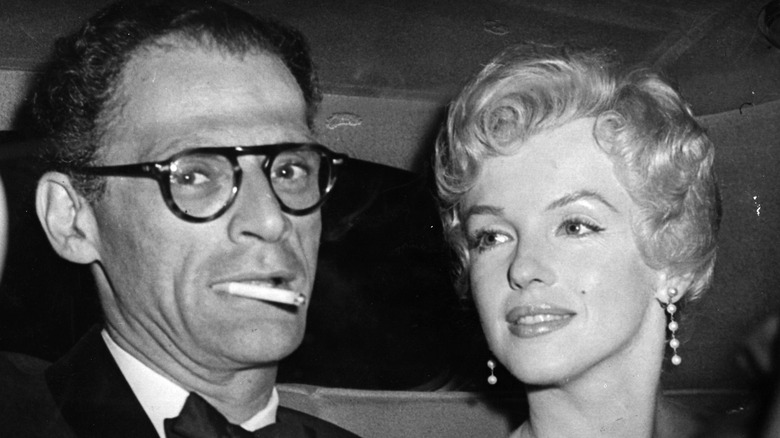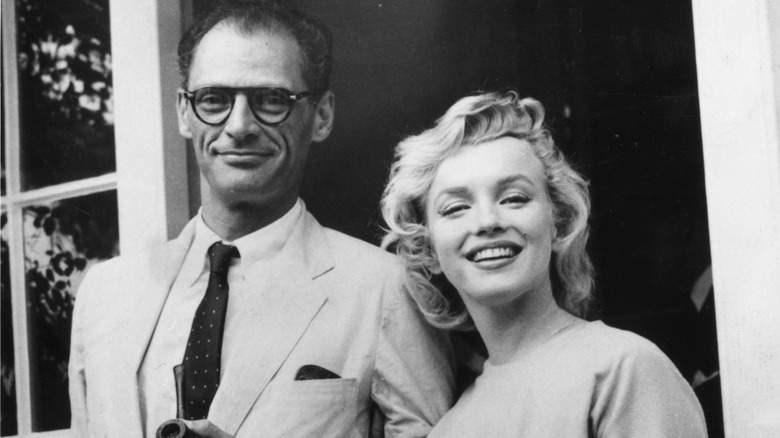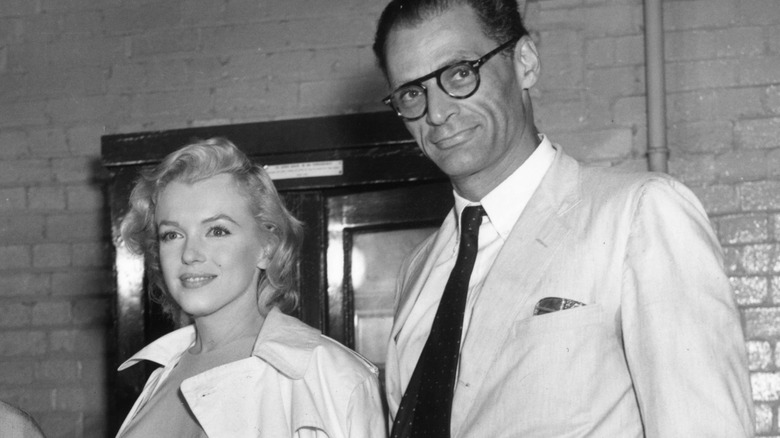Inside Marilyn Monroe's Marriage To Arthur Miller
During her life, famous actor Marilyn Monroe — who got her name in an interesting way — was widely known and beloved worldwide for her dominance in Hollywood's Golden Age. Monroe's film career skyrocketed in the early 1950s due in part to revelations that she had posed for nude pictures several years prior that were reprinted in Playboy. She became one of the most popular sex symbols of the time — a recognition she arguably still holds today.
Of course, her troubled yet dynamic personal life was also of great interest to many people, the details of which made headlines throughout her lifetime. Monroe famously married baseball legend Joe DiMaggio in 1954 before getting divorced less than a year later. She got married once more before the end of her short life in 1962. In 1956, Monroe wed playwright Arthur Miller with whom she remained until early 1961, a year and a half before her untimely and tragic death.
Although many fans of the cultural icon remember her famous marriage to Miller, some may not know the truth about what led to it or their breakup. And, as it turns out, even some of Monroe's most dedicated devotees may be surprised by some of the details.
Marilyn Monroe converted to Judaism for Arthur Miller
Marilyn Monroe met her future husband, Arthur Miller, in 1950, per Biography. They met through film and theatre director Elia Kazan, who Monroe was casually seeing at the time. Monroe was 24 years old and an actor struggling to find work, while Miller was 35 years old and was already a well-established playwright. His magnum opus, "Death of a Salesman," premiered the previous year. When they met, he was also married to his first wife, Mary Slattery. Of course, Monroe would marry Joe DiMaggio in 1954, about four years after meeting Miller.
Nonetheless, the two reportedly developed an affair shortly after meeting — an affair which likely lasted on and off until they divorced their respective spouses around 1955 and 1956, and married each other (per the Guardian). Monroe fell deeply in love with Miller and became sick of her Hollywood life. She supposedly wanted to elope with him away from the cameras. According to Architectural Digest, shortly after they wed, she told him, "I hate Hollywood, I don't want it any more. I want to live quietly in the country and just be there when you need me. I can't fight for myself any more."
Additionally, her biographer, Jeffrey Meyers, said that Monroe converted to Judaism for Miller to "express her loyalty and get close to both Miller and his parents." As fans will recall, they also tried — multiple times — for a baby together, but each attempt sadly ended in a miscarriage, likely due in part to Monroe's endometriosis.
Marilyn Monroe's final film was written for her by her husband
There's no doubt that, throughout their marriage, Marilyn Monroe was emotionally committed to her husband, Arthur Miller. Around the late 1950s, per Esquire, she wrote of Miller in her personal notes: "I am so concerned about protecting Arthur. I love him — and he is the only person — human being I have ever known that I could love not only as a man to which I am attracted to practically out of my senses — but he is the only person — as another human being that I trust as much as myself."
However, by 1960, their marriage was falling apart, in part due to Monroe's unhealthy substance use issues. It was also around this time that Monroe had begun work on her final completed film, "The Misfits," the screenplay of which Miller had written largely for her. According to Today, contemporary critics largely agree that, despite the drama behind the scenes, Monroe's performance in the movie is considered one of her best. Before the film was released in 1961, Monroe and Miller had divorced. In February 1962, Miller married his third (and final) wife, Inge Morath (via W Magazine). Monroe would die of a drug overdose about six months later.
However, despite their troubled final days, Miller still had fond memories of his ex-wife. In 1988, he called Monroe an example of "perfection," who seemed to "invite the inevitable wound that would make her more like others," (per The New York Times via University of Pennsylvania).



